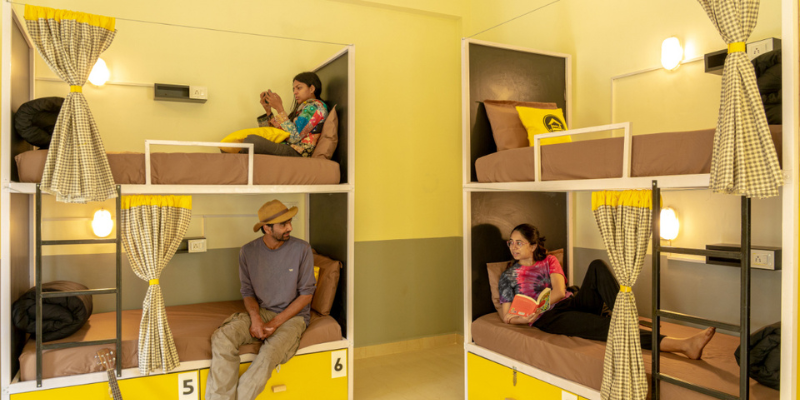Startup
Thales, Garuda Aerospace sign MoU to promote drone ecosystem in India

Aerospace industry giant Thales and Garuda Aerospace signed a Memorandum of Understanding (MoU) to promote the development of the drone ecosystem in India.
With this collaboration, the two companies aim to foster innovation and advance the development of technological solutions that can enable safe and secure drone operations and help the growth of drone-based applications in India, the company said in a statement.
The MoU is set to come into effect in August 2024.
Based on the agreement, Thales is set to contribute with its expertise in Unmanned Traffic Management (UTM) solutions, Unmanned Aerial Vehicle (UAV) flight authorisations and detection, and system integration.
“We are proud to partner with Garuda Aerospace in paving the way for the development of advanced UTM systems in India by leveraging our extensive global experience and expertise in aeronautical solutions. This collaboration aligns well with the Aatmanirbhar Bharat (Self-Reliant India) vision, and seeks to support India in realising its ambition to become a major global hub for drones by 2030,” said Ashish Saraf, VP and Country Director, Thales in India.
Meanwhile, Garuda brings to the table its skills in the manufacture and use of UAVs, and expertise in the Indian market, the company said.
According to Agnishwar Jayaprakash, Founder and CEO, Garuda Aerospace, the company has cemented market dominance in the precision agri drone segment where 50% of agri drones in India are made by Garuda.
“Equipped with the largest fleet in India coupled with Thales’ UTM technology and their worldwide experience, Garuda Aerospace will aim to revolutionise the drone sector and play a key role in the transformation of India into a global drone powerhouse,” he added.
Startup
Hosteller raises Rs 48 Cr in Series A round led by V3

Backpacker hostel brand The Hosteller has raised Rs 48 crore in a Series A funding round. V3 Ventures led the equity round, contributing Rs 32 crore, with Blacksoil providing an additional Rs 16 crore in venture debt.
Other key investors include Synergy Capital Partners, Unit e-Consulting, Real Time Angel Fund, and several high-profile investors like Harsh Shah from the Naman Group Family Office.
The investment will allow the company to strengthen its presence in cities like Rishikesh and Manali, while also expanding into new destinations across India.
“We aim to have 10,000 beds by March 2026 from the existing 2,500 beds. Backpacker hostels have become the go-to choice for GenZ and millennial travellers in the post-covid era. The fresh capital will not only accelerate our expansion but also help us acquire customers from the newer territories,” Pranav Dangi, Founder and CEO of The Hosteller, said in a statement.
“We noticed a change in the way GenZ travels–from saving up for 1 holiday a year to travelling every long weekend. And, The Hosteller fulfills this exact need. With a standardised, tech-first, budget-friendly option – the brand offers something truly unique to its customers. This makes us even more excited about the growth ahead. The Hosteller has demonstrated outstanding execution capabilities in the consumer and travel space,” Arjun Vaidya, Co-founder of V3 Ventures, said.
Hostel companies are significantly benefitting from the rise of digital nomadism, a trend that has reshaped the hospitality landscape. Digital nomadism refers to a lifestyle where individuals leverage technology to work remotely while traveling to various locations. This modern way of living allows people to combine work and travel, enabling them to explore new cultures and environments without being tied to a specific office or geographical location.
The Hosteller was founded by Pranav Dangi in 2014. It began with the vision of creating accessible and affordable backpacker hostels across India, aiming to cater to the needs of young travelers. Since its inception, The Hosteller has rapidly grown to become one of India’s largest self-operated backpacker hostel chain, with a presence in over 55 destinations across the country.
Startup
Magenta Mobility’s FY24 revenue rises three fold, losses widen by 17.1%

Magenta Mobility on Thursday reported a 199.5% jump in its full-year revenue to Rs 35.53 crore compared to Rs 11.86 crore in the previous year helped by a significant rise in its revenue from services.
The company provides a 100% electric fleet and AI and IoT-enabled fleet management and data analytics platform to optimise logistics operations and deliveries. Revenue from these services for the year ended March 31, 2024, increased to Rs 30.17 crore compared to Rs 10.15 crore in FY23.
However, the company reported a 17.1% increase in its loss for the period to Rs 46.44 crore as opposed to Rs 39.66 crore in FY23, bogged down by rising expenses during the year. The 109.1% rise in expenses to Rs 90.17 crore was primarily due to rising driver costs, employee benefit expenses, and finance costs.
Magenta Mobility appoints drivers on a contract basis to provide services to its customers, which it accounts as an expense. The drivers’ cost for FY24 increased to Rs 18.49 crore, compared to Rs 6.34 crore in FY23.
The rise in demand for the company’s fleet comes amidst a boom in the last-mile delivery sector in India owing to the rise of ecommerce and quick commerce players. Magenta Mobility caters to clients such as Flipkart and hyper-local delivery platform Dunzo, among others.
Founded in 2017 by Maxson Lewis and Darryl Dias, the company last raised $22 million in a Series A funding round from BP Venture and Morgan Stanley India Infrastructure-managed investment fund.
Startup
Juspay cuts losses by 7.7% as revenue surges 49.6% in FY24

Payments startup Juspay Technologies saw its losses narrowing in FY24 as revenue growth outpaced expenditure. It narrowed its total loss for the period to Rs 97.54 crore, down 7.76% from Rs 105.75 crore in FY23.
According to the consolidated financial statements accessed from the Registrar of Companies, the SoftBank-backed fintech firm’s revenue from operations surged 49.64% to Rs 319.32 crore, up from Rs 213.39 crore in FY23.
Juspay’s primary revenue source—payment platform integration fees—brought in Rs 286.52 crore. Additional operating revenue from services like product implementation and support added Rs 32.80 crore.
Total expenses rose by 29.52% to Rs 443.74 crore in FY24, compared to Rs 342.59 crore in the previous year. This increase was largely driven by employee benefit expenses, which saw a 41.73% jump to Rs 303.36 crore, while other expenses increased slightly over 3.56% to Rs 123.76 crore.
Juspay, founded in 2012 by Vimal Kumar and Ramanathan RV in Bengaluru, specialises in developing payment orchestration solutions that act as a technology layer over traditional payment gateways.
The Accel-backed startup has also developed Namma Yatri, a mobility app focusing on ride-hailing services, leveraging Juspay’s strengths in payments and open-source protocols. Namma Yatri is built on the Beckn Protocol and aligns with the Open Network for Digital Commerce (ONDC), aiming to provide low-cost ride-hailing options and open access to digital mobility services.
Recently, Juspay decided to spin off Namma Yatri as an independent entity to attract separate investors and scale further. In February, the company said it acquired LotusPay in an all-cash deal to strengthen its offerings to the BFSI segment and merchants.
LotusPay, founded in 2016, pioneered NACH Debit technology with cloud-based software for merchants and banks. Using NPCI’s NACH Debit, it facilitates recurring payments for loans, insurance, and subscriptions.
-

 Startup Stories1 year ago
Startup Stories1 year agoWhy Millennials, GenZs Are Riding The Investment Tech Wave In India
-

 Startup Stories1 year ago
Startup Stories1 year agoStartups That Caught Our Eyes In September 2023
-

 Startup Stories1 year ago
Startup Stories1 year agoHow Raaho Is Using Tech To Transform India’s Fragmented Commercial Trucking
-

 Startup Stories1 year ago
Startup Stories1 year agoMeet The 10 Indian Startup Gems In The Indian Jewellery Industry’s Crown
-

 Crptocurrency8 months ago
Crptocurrency8 months agoLither is Making Crypto Safe, Fun, and Profitable for Everyone!
-

 Startup Stories1 year ago
Startup Stories1 year agoHow Volt Money Is Unlocking The Value Of Mutual Funds With Secured Lending
-

 Startup Stories1 year ago
Startup Stories1 year agoWhy Moscow-Based Kladana Considers Indian SME Sector As The Next Big Market For Cloud Computing
-

 E-commerce1 year ago
E-commerce1 year agoTop Online Couponing Trends To Watch Out For In 2016




